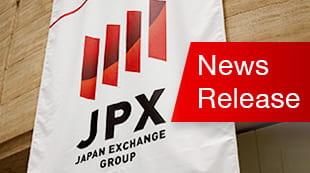Search results 321-330 / 10648
- sort:
- relevance
- latest

Disciplinary Actions (TSE) | Japan Exchange Group Disciplinary Actions Tokyo Stock Exchange Osaka Exchange Tokyo Commodity Exchange TSE requires trading participants to comply with laws and regulations, and imposes penalties such as fines on trading participants that violate the laws and regulations. Date Trading Participant Violation Disciplinary Action (reference) Regulatory Action Details Jun. 20, 2025 Tachibana Securities Co., Ltd. (1) Providing a customer with false information in connection with the conclusion of a financial instruments transaction contract or in connection with the solicitation thereof, (2) An act to make a false representation or a representation that will likely give a false impression on important matters regarding entering into a financial instruments transaction contract or solicitation therefor Censure - Dec. 16, 2024 Nomura Securities Co., Ltd. This constituted a series of market derivatives transactions on the Company’s account that would potentially mislead others into believing that trading of the JGB Futures is ...

Trading Participation Fees | Japan Exchange Group Tokyo Stock Exchange Osaka Exchange Tokyo Commodity Exchange TSE’s trading participation fees, paid by trading participants, are composed of: Basic fees Trading fees (based on trading value (volume)) Access fees (based on the number of orders placed) Trading system facility usage fees (based on the status of use of trading systems) Trading Participant Fees OSE’s trading participant fees, paid by trading participants, are mainly composed of: Basic fees (based on the classification of the trading qualification held) Trading fees (based on trading volume or trading value) Give-up fees (based on volume of sales/purchases pertaining to give-up) Derivatives trading system connection fees (based on the status of use of trading systems) Trading Participant Fees TOCOM’s Membership fees, paid by Members, are mainly composed of: Basic fees (based on the classification of the trading qualification held) Trading fees (based on ...

List of Trading Participants | Japan Exchange Group List of Trading Participants A-C D-H I-K L-M N-R S-T U-Z A-C D-H I-K L-M N-R S-T U-Z Trading Participants Tokyo Stock Exchange Osaka Exchange TOCOM General Trading Participants Futures, etc. Trading Participants Government bond futures, etc. Trading Participants Commodity futures, etc. Trading Participants Broker Participants Trade Participants ABN AMRO Clearing Tokyo Co., Ltd. ● ● AIZAWA SECURITIES CO.,LTD. ● ● Akatsuki Securities, Inc. ● ● Ando Securities Co.,Ltd. ● ● Aozora Bank, Ltd. ● ARK SECURITIES CO.,LTD. ● ASAHI YUGYO Co., Ltd. ● ASTMAX Co., Ltd. ● Banpu Power Trading G.K. ● Bansei Securities Co.,Ltd. ● ● Barclays Securities Japan Limited ● ● BNP Paribas Securities (Japan) Limited ● ● BofA Securities Japan Co.,Ltd. ● ● The Chiba Bank, Ltd. ● Chibagin Securities Co.,Ltd. ● ● China International Capital Corporation Hong Kong Futures Limited*1 ● The Chugoku Bank, Limited ● Citadel Securities (Hong Kong) Limited (Remote ...

What is a Trading Participant? | Japan Exchange Group Types of Trading Participants What is a Trading Participant? Acquisition of Trading Qualifications "Trading participant" refers to Financial Instruments Business Operators (securities companies), Transaction-at-Exchange Operators, Registered Financial Institutions and Commodity Derivatives Business Operators, etc. holding qualifications to directly participate in Tokyo Stock Exchange or Osaka Exchange market or Tokyo Commodity Exchange. To become a trading participant, it has to pass exchange's qualification acquisition examination. Furthermore, acquisition of Japan Securities Clearing Corporation clearing qualifications or (in cases where clearing will not be conducted by such operator) designation of an agency clearing participant with which clearing is entrusted is required when acquiring trading qualifications. General Trading Participants (TSE) General Trading Participants are able to trade securities in an Exchange Securities Market that the TSE provides. (Limited to Financial Instruments Business Operators and Transaction-at-Exchange Operators.) Futures, etc. Trading Participants (OSE)...

Remote Trading Participant System | Permission from Overseas Relevant Authorities | Japan Exchange Group Remote trading participant system Permission from relevant authorities concerning remote trading participant system Remote Trading Participant System Permission from Overseas Relevant Authorities concerning overseas investor The Remote Trading Participant system allows foreign financial instruments firms without business bases in Japan to directly participate in the exchange market as trading participants. It was introduced in 2009. Remote trading participants are able to acquire the same trading qualifications as those of regular trading participants. However, applicants are required to be authorized pursuant to the Financial Instruments and Exchange Act (FIEA) as a Transaction-at-Exchange Operator* and then approved as a remote trading participant after exchange's qualification acquisition examination. Furthermore, remote trading participants are able to conduct transactions in the same manner as regular trading participants. However, they are not allowed to accept orders entrusted by residents in Japan ...

Capital Adequacy Ratio of General Trading Participants | Japan Exchange Group What is the Capital Adequacy Ratio? Capital Adequacy Ratio Calculation Method Criteria stipulated by laws and regulations regarding capital adequacy ratios List of Capital Adequacy Ratios of General Trading Participants The "capital adequacy ratio" is an important indicator to measure the financial soundness of securities firms. In the balance sheet, which is one of the financial statements, "liabilities" are called "others' capital" because they need to be repaid to others, while the total capital minus liabilities is the capital you own, or “owned capital.” The "capital adequacy ratio" is an index calculated by dividing the "amount of unfixed equity capital" (i.e., equity capital minus fixed assets) by the "amount equivalent to risk" corresponding to risks that may occur due to various circumstances. The Financial Instruments and Exchange Act stipulates that securities companies must prepare a document stating their capital ...

Tables for Comparison of New and Old Rules and Regulations (TSE) | Japan Exchange Group Tokyo Stock Exchange, Inc. Osaka Exchange, Inc. Tokyo Commodity Exchange, Inc. Japan Exchange Regulation Archives: 2025 2024 2023 2022 2021 2020 2019 2018 2017 2016 2015 2014 2013 2012 2011 2010 Announcement Date Description Outline Comparison Table Jul. 10, 2025 Revisions to Brokerage Agreement Standards in Relation to Revisions to the Handling of Unreceived Dividends, etc. Pertaining to Deposited Securities, etc. Jul. 07, 2025 Revisions to Securities Listing Regulations and Other Rules Pertaining to MBOs and Subsidiary Conversions Apr. 03, 2025 Revisions to Securities Listing Regulations and Other Rules Pertaining to Revisions to the Initial Listing Day in the Case of Spin-Offs Mar. 25, 2025 Revisions to Regulations Regarding Margin Transactions and Loans for Margin Transactions and Other Rules Pertaining to Revisions to Methods of Information Provision Between Trading Participants and Customers in Connection with ...

Our Business | Japan Exchange Group Overview Business Model Tokyo Stock Exchange Osaka Exchange Tokyo Commodity Exchange JPX Market Innovation & Research, Inc. Japan Exchange Regulation Japan Securities Clearing Corporation Japan Exchange Group, Inc. (JPX) was established via the business combination between Tokyo Stock Exchange Group and Osaka Securities Exchange on January 1, 2013. JPX operates financial instruments exchange markets to provide market users with reliable venues for trading listed securities and derivatives instruments. In addition to providing market infrastructure and market data, JPX also provides clearing and settlement services through a central counterparty and conducts trading oversight to maintain the integrity of the markets. In the course of working together as an exchange group to offer a comprehensive range of services, we continue to make every effort to ensure reliable markets and create greater convenience for all market users. On October 1, 2019, JPX expanded its business into commodity derivatives trading ...

Market Holidays | Japan Exchange Group 2025 2026 2025 2026 JPX markets are closed on Saturdays, Sundays, national holidays, and on the dates indicated below. (Note) Exchange holidays are subject to change due to changes to national holidays under Japan's Act on National Holidays. The Night Session at OSE and TOCOM is conducted after business hours on all business days until 5:30 a.m. the next day, including cases where the next day is a Saturday or a day on which the market is closed. Conversely, there is no Night Session on non-business days (Saturdays, Sundays, national holidays, etc.) even if the next day is a business day. Additionally, clearing is not conducted on non-business days. Night Session (Derivatives) Regarding derivatives holiday trading days, please refer to the following page. Holiday Trading Jan. 1 (Wed.) New Year's Day Jan. 2 (Thu.) Market Holiday Jan. 3 (Fri.) ...

Group CEO Message | Japan Exchange Group Related Links In fiscal year 2025, JPX Group has started its Medium-Term Management Plan 2027. JPX Group's overall mission is to contribute to the realization of an affluent society by promoting sustainable development of the market. To continue fulfilling this mission, JPX Group set out its long-term vision for 2030, which is to "contribute to sustainable societal and economic development by evolving into a global, comprehensive finance and information platform which provides solutions for a wide range of societal issues, centered on the ability to raise and circulate capital." Under the Medium-Term Management Plan 2024 started in FY2022 for achieving this long-term vision, progress has been made in improving the attractiveness of the Japanese stock market, as well as expanding the product lineup for interest rates and energy-related products and expanding business areas, including through M&As in ...














